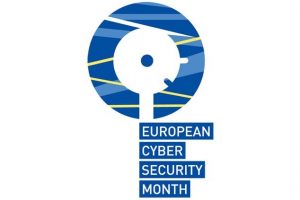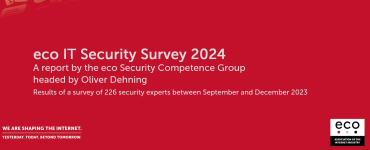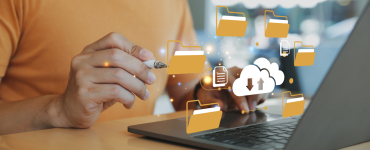- Practical tips for more security at work for European Cyber Security Month 2018
- Five simple rules for effective basic protection
Cologne, 16.10.2018 – Almost 90 of the population are now online, according to a recent online survey by the German broadcaster ARD/ZDF, and office work without the Internet is hardly imaginable anymore. But to make sure that emails, messengers und web applications really do simplify our daily life, there are a range of important basics, such as virus protection and secure passwords. For the European Cyber Security Month, eco – Association of the Internet Industry offers five practical tips for more IT security in the office, to raise awareness for the importance of basic protection.
“You don’t need to be a cyber security expert to be relatively safe online,” Oliver Dehning, Leader of the eco Competence Group Security, explains. “These five simple rules help to create an effective basic level of protection.”
Basic Tip 1: Keep software up-to-date
Many security vulnerabilities are eliminated through software updates. That’s why it is important to keep programs on office computers, mobile devices and servers up-to-date and install updates promptly. Ideally, you should use the automatic update function. Don’t ignore information about updates, and don’t put them off for later.
Basic Tip 2: Take protective measures
Security software like anti-virus programs and firewalls are a must for all PCs, tablets and smartphones, because that’s the only way to defend yourself against new threats. It’s important that the software is always kept up-to-date. You should never ignore warnings; if in doubt, get to the bottom of it or call in an expert.
Basic Tip 3: Secure handling of passwords
Direct access to the computer or to applications is a common gateway for attacks on office computers. Use individual and strong passwords, especially in the Internet, and do not share these with anyone. To make sure you can remember all your passwords, a password manager that can be used across multiple devices is very helpful. Always lock your screen when you leave your workstation, even if it’s only for a moment.
Basic Tip 4: Be careful with USB sticks
USB sticks are practical, and make transporting data easier. Unfortunately, they can also transfer computer viruses, if they have previously been used in poorly-secured computers or devices. If you can do without one, then do so. Otherwise, scan the USB stick with your anti-virus software. You should also be careful when you connect other USB devices like e-cigarettes or toys to your PC to recharge them.
Basic Tip 5: Use security scans
Files on your office computer should be scanned regularly with the installed anti-virus software to look for previously undetected infections. For the company website, SIWECOS (https://siwecos.de/) offers a quick check and a thorough daily scan for known vulnerabilities, free of charge. And botfree (https://www.botfree.eu) offers a collection of free tools against malware, as well as information and instructions for scanning and cleaning computers.




